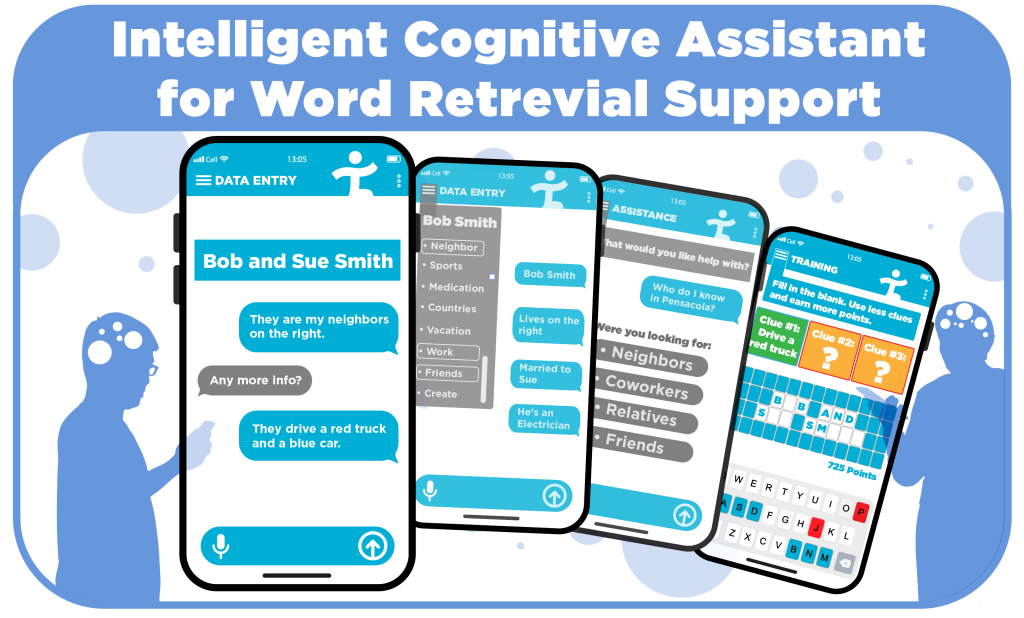Investigators:
Archna Bhatia, Institute for Human & Machine Cognition
George Sperling, University of California Irvine
MassAITC Cohort: Year 2 (AD/ADRD)

Project Accomplishments: This project developed MyWords!, a mobile app designed to help older adults—especially those with early memory loss or Alzheimer’s—find the right words during everyday conversations. The app enables users to store and retrieve personal information through natural language queries, supporting memory and communication needs. During the pilot, the team released MyWords! on the iOS App Store and conducted usability testing with 17 older adults, using their feedback to improve features, interface clarity, and personalization.
While pilot testing with individuals with cognitive impairment was deferred pending further refinement, the project established a strong technical foundation, advanced core functionality, and laid the groundwork for future evaluation and deployment. This work contributes to the development of ethically grounded, AI-based tools that support independence and quality of life for aging populations.
Initial Proposal Abstract: Word retrieval issues, experienced by aging adults in general, severely affect those with Alzheimer’s Disease and Related Dementias (ADRD), leading to frustration, embarrassment, loss of confidence, anxiety and avoidance of social interactions, thus influencing their personal, psychological and social life activities and increasing burden on their caregivers. This project aims to develop an Intelligent Cognitive Assistant (ICA) that provides support to these individuals in real-time word retrieval and personalized training to enhance their word retrieval, in order to support key activities of daily living involving communication and social connectivity and thus improve their QoL and lower their caregivers’ burden.
The proposed one-year project’s objectives include developing the proposed Intelligent Cognitive Assistant, testing it’s usability and evaluating its appropriateness/relevance of responses/training to the individual users. Usability testing will involve alpha-testing the participatory design of ICA with 10-20 volunteers for six months who will iteratively provide design feedback to inform further developments/improvements in usability of the ICA interfaces. For a robust performance of the ICA system, a wide range of participants with incipient ADRD and/or MCI (n=20) will evaluate its response appropriateness/relevance to them longitudinally for three months through a pilot study. The outcome measures will include items such as participants’ satisfaction with ICA in different modes (data acquisition, assistance and training), ease of use, interfaces working as expected, appropriateness of responses and training, and improvements in these measures with longitudinal use of ICA.
The developed ICA application will provide cognitive orthosis to elderly individuals with ADRD in terms of real-time word retrieval support and automated individualized training to strengthen their word-context associations for retrieval, which will support them in their key activities of daily living, cognitive skills as well as communication and social connectivity, thus improving their QoL and reducing caregivers’ burden. Additionally, the usability testing and the pilot study will advance our understanding of aspects of AI-enabled mobile technologies that interact with users in ways that make such technologies more accessible and responsive to users’ needs.
Outcomes:
- Oral Presentation: Alzheimer’s Association International Conference 2024 – Technology and Dementia Preconference
 Archna Bhatia presented” Intelligent Cognitive Assistant leveraging natural language processing to provide word retrieval” at the a2 Collective Session at the Technology and Dementia Pre-conference.
Archna Bhatia presented” Intelligent Cognitive Assistant leveraging natural language processing to provide word retrieval” at the a2 Collective Session at the Technology and Dementia Pre-conference. - New Product Launch: MyWords available on AppStore
 IHMC has released the current version of MyWords application AppStore. This version was developed as part of IHMC’s pilot award from MassAITC. Corresponding tutorial materials and information about the application will be added and updated at this public website: https://github.com/MyWords-app/MyWords
IHMC has released the current version of MyWords application AppStore. This version was developed as part of IHMC’s pilot award from MassAITC. Corresponding tutorial materials and information about the application will be added and updated at this public website: https://github.com/MyWords-app/MyWords - Poster Presentation: a2 National Symposium 2024
 Title: Intelligent Cognitive Assistant for Word Retrieval Support for Older Adults with Incipient ADRD Authors: Archna Bhatia, Roger Care, William de Beaumont, Lingyu Gan, Misha Pavel, Peter Pirelli, George Sperling
Title: Intelligent Cognitive Assistant for Word Retrieval Support for Older Adults with Incipient ADRD Authors: Archna Bhatia, Roger Care, William de Beaumont, Lingyu Gan, Misha Pavel, Peter Pirelli, George Sperling
